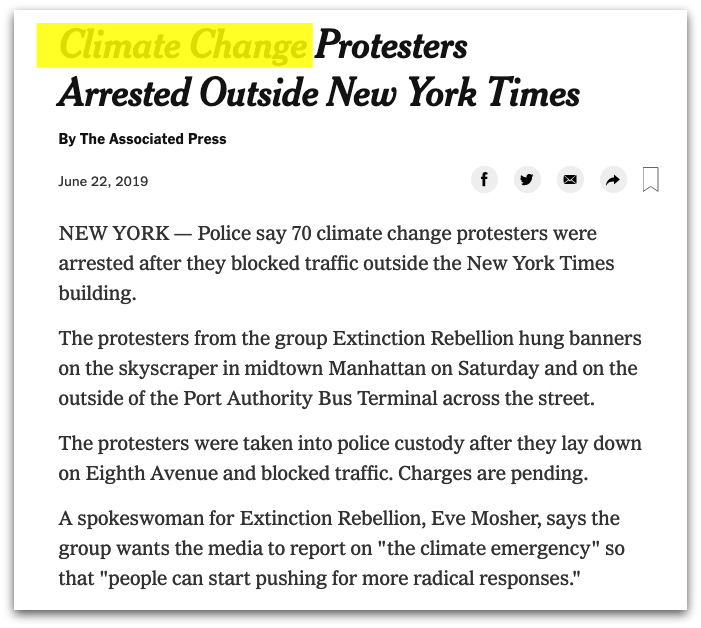Above Photo: Coordinated by Extinction Rebellion NYC, 70 people or more were reported arrested after the group staged a sit-in on Eight Avenue in midtown Manhattan in order to bring attention to the failure of the paper—and that of the journalism industry overall—to adequately report on the global urgency of skyrocketing greenhouse gas concentrations in the atmosphere, rapidly warming oceans, and all the associated perils that result. (Photo: Civic NYC/@CivicNYC)
“This is the biggest crisis in human history. What are we going to tell our children when they ask us: why didn’t we do anything to stop it while we still had time?”
Hundreds of people descended on the headquarters of the New York Times on Saturday to demand the “paper of record” drastically improve its coverage of the global climate crisis and specifically demanded its reporters refer to the situation as a “climate emergency” in alignment with what the world’s scientific community is warning.
Coordinated by Extinction Rebellion NYC, 70 people were reported arrested after the group staged a sit-in on Eight Avenue in midtown Manhattan in order to bring attention to the failure of the paper—and that of the journalism industry overall—to adequately report on the global urgency of skyrocketing greenhouse gas concentrations in the atmosphere, rapidly warming oceans, and all the associated perils that result. The group hung banners in front of the Times building as well as from the Port Authority Bus Terminal on the other side of the street.
Standing on the street corner, scores of people repeated the chant: “Report the urgency, this is a climate emergency!’
Report the urgency! This is a #ClimateEmergency @nytimes pic.twitter.com/dwlfLI1gEM
— Ray (@brother_peaches) June 23, 2019
Others, as shown in this footage captured by News2Share, shouted “Tell the truth! Tell the truth!” as they sat down in the street and refused to leave:
Detailing their demands, the group has put forth a “Climate Media Standards” document which offers guidance to outlets, editors, and reporters for how to best provide coverage. For example, the standards call for use of “climate emergency language” in all reporting:
- Stop calling it “climate change.” Name the threat: “climate crisis,” “climate breakdown,” “climate destruction,” or “climate emergency.”
- Use language that states the risks of the crisis more clearly. For example, “global warming” becomes “global heating,” and “biodiversity” becomes “wildlife.”
- Do not publish statements that cast doubt on the scientific consensus that a catastrophic climate crisis is under way and driven by human activity.
- Do not print the opinion of writers who cast doubt on the scientific consensus and the effects of the climate emergency.
Ironically, however, it appeared the Times did not read the memo because their own coverage of Saturday’s protest—which was actually just an Associated Press wire version of the events—did not take the advice:
Demonstrator Donna Nicolino told the Guardian she was willing to risk arrest because “we want the New York Times as well as all the other media to treat climate change as the crisis it is.”
As one demonstrators was brought down from the side of a building in handcuffs by police, she shouted to the crowd: “This is the biggest crisis in human history. What are we going to tell our children when they ask us: why didn’t we do anything to stop it while we still had time?”
“This is the biggest crisis in human history. What are we going to tell our children when they ask us: why didn’t we do anything to stop it while we still had time?”@XR_NYC @nytimes video credit: @Commandarama pic.twitter.com/SaVROJoFGJ
— Extinction Rebellion MA 🐝⌛🦋 (@XRboston) June 22, 2019
As Greta Thunberg, the sixteen-year-old Swedish climate campaigner and driving force behind the global student strike movement, has said, “If there really was a crisis this big, then we would rarely talk about anything else. As soon as you turn on the TV, almost everything would be about that: headlines, radio, newspapers. You would almost never hear or read about anything else.”
Just like lawmakers, say Thunberg and her allies, too many major media outlets pay lipservice to the scale of the crisis but then fail to back up that rhetoric with meaningful action or commitments.
“The lack of coverage of the climate crisis is completely unacceptable,” Becca Trabin, a member of Extinction Rebellion organizing team, explained to the Guardian on Saturday. “It’s a public safety crisis on a global scale.”



